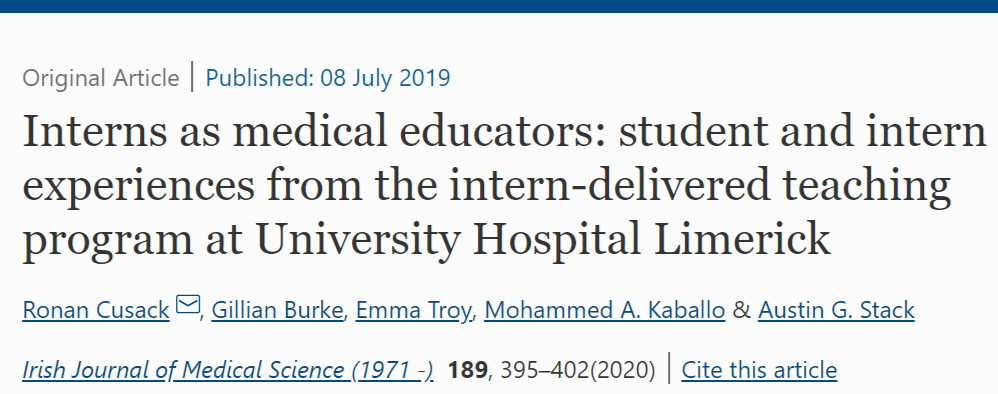Authors: Cusack R, Burke G, Troy E, Kaballo MA, Stack AG.
Abstract
BACKGROUND: The acquisition and assimilation of knowledge through history-taking and clinical skills practice are core aspects of training for medical students. Interns, who have recently graduated and have entered into clinical practice, are uniquely positioned to assume a pivotal role in student education.AIMS: The goal of this study was to evaluate feedback from both students as well as intern tutors on the intern-delivered teaching program at University Hospital Limerick (UHL) from 2015 to 2016.
METHODS: Eighty-five interns participated in the program at UHL in 2015 and 2016, aiming to deliver four 1-h tutorials to 285 Year 3 or Year 4 students from UL Graduate Entry Medical (GEMS) Program. A flexible schedule focused on practical skills and knowledge translation was created with oversight from Lead Interns and Professor of Medicine, with administrative support. Feedback was assessed using anonymous survey questionnaires. RESULTS: The survey response rate was 74% in 2015 and 75% in 2016. Student feedback on the performance of intern tutors was positive. More than 50% of students deemed tutorials on history-taking and clinical examination as the most valuable. Over 76% of students indicated a desire to participate as tutors after graduation. Logistical issues in agreeing mutually suitable timeslots were identified as the major barrier for delivery of teaching. From the intern perspective, over 85% reported benefits in areas of professional development and knowledge consolidation.
CONCLUSIONS: Participation in intern-delivered teaching leads to clinical and educational benefits for both students and interns. However, several logistical barriers were identified and require refinement.
Cusack R, Burke G, Troy E, Kaballo MA, Stack AG. Interns as medical educators: student and intern experiences from the intern-delivered teaching program at University Hospital Limerick. Ir J Med Sci. 2019 Jul 8. doi: 10.1007/s11845-019-02056-x. [Epub ahead of print] PubMed PMID: 31286405. https://link.springer.com/article/10.1007%2Fs11845-019-02056-x
